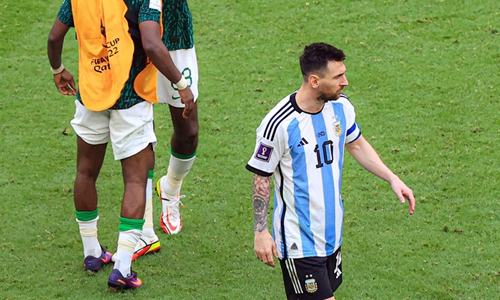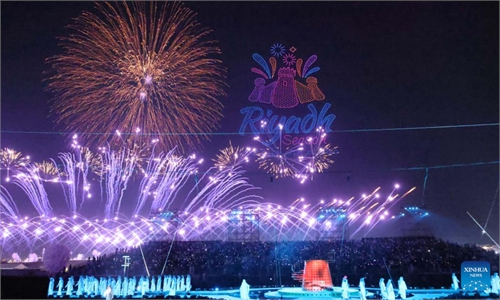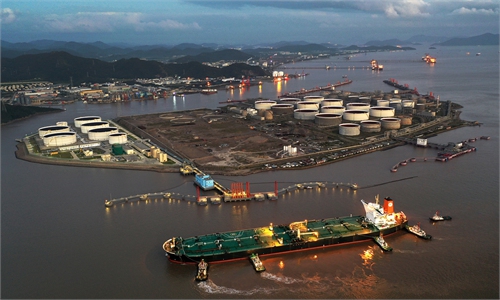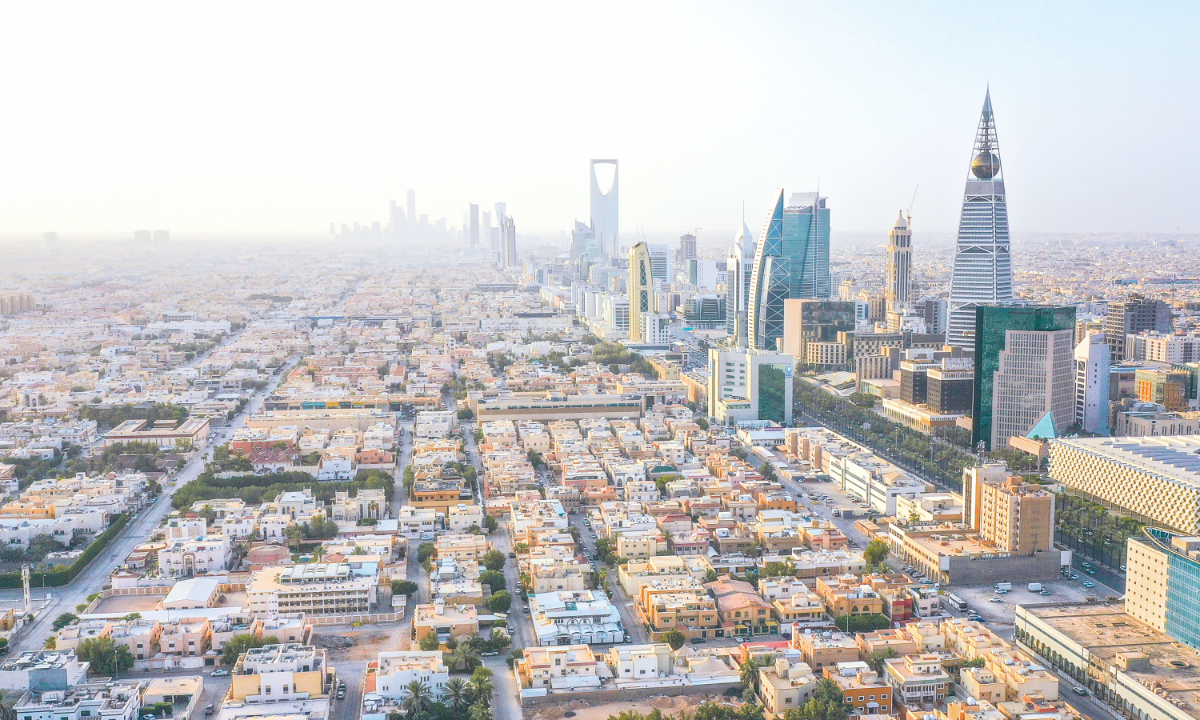
A view of Riyadh, the capital of Saudi Arabia. Photo: VCG
China will take the upcoming summit between China and Arab states as an opportunity to carry forward traditional friendship, deepen cooperation in all areas, step up exchanges between respective civilizations, and build a China-Arab states community with a shared future in the new era, said a recent report issued by the Chinese Foreign Ministry.
Saudi Arabia is an energy powerhouse with the world's second largest proven reserves of crude oil. In recent years, in order to get rid of the dependence on the oil economy, Saudi Arabia has been promoting the long-term development goal through a series of reform and opening up. As a country with an increasingly important role in international affairs, Saudi Arabia has been on a trend of "looking East" and "investing in the future" in seeking sustainable prosperity.
Experts said that the mutually-beneficial cooperation between China and Saudi Arabia can help with these goals.
From energy dependence to economic diversification

An oil rig in Saudi Arabia to be converted into an offshore theme park for a tourist resort. Photo: VCG
For those who have never been to Saudi Arabia, the Gulf state which stands as an oil empire is a mystery.
Each time when the Global Times reporters visited Saudi Arabia in recent years, the changes are obvious. Riyadh, the capital of Saudi Arabia, is now a green, vibrant, modern city with great pop star performances, fierce boxing matches, women driving cars, opening cinemas... A growing number of foreign tourists can be seen in many provinces, and the number and use of the religious police appears to have lessened over time.
Saudi Arabia has submitted an official bid to the Asian Football Confederation to host the AFC Women's Asian Cup 2026, local news sources reported recently.
The international consensus is that the changes in Saudi Arabia cannot be achieved without its "Vision 2030" and the "National Transformation Program 2020." The Program was launched in 2016 to achieve governmental operational excellence and establish the necessary infrastructure to improve economic enablers and raise the standard of living through its eight strategic themes.
Observers said Saudi Arabia, which is accelerating economic reforms to wean itself off oil, is also increasingly turning to Asia for various development opportunities.
Saudi Arabia will see more crucial changes in the future due to its size, strength of its economy, and an independent foreign policy, Mahammed Alkemel, head of the Institute of Arab Research and Studies in Egypt, told the Global Times.
Since the implementation of Vision 2030, a "Saudi-style reform and opening up" has since been in motion, turning the country from a traditional energy-dependent state to a modern one with a diversified economy, Wang Tingyi, an assistant professor at Tsinghua University on Islamic studies, who has been tracking the changes happening in Saudi Arabia for years, told the Global Times.
First, Saudi women's participation in social life has increased significantly. More than half of the workers at Riyadh King Khalid International Airport arrival area are women, and there are also many women at the headquarters of the Saudi Arabia's Public Investment Fund, which was unimaginable before, Wang introduced.
Second, there is a clear shift in attitudes among young Saudis. In the past, young Saudis were reluctant to take up manual jobs such as driving taxis, jobs mostly held by Indian and Pakistani migrant workers. Today, Uber drivers in Saudi Arabia are almost all young locals, some with other part-time jobs. In Dammam, a city in eastern Saudi Arabia, young Saudis even set up street stalls, he said.
According to Wang, tourist visas for Saudi Arabia used to be extremely difficult to obtain, but now they can be issued within minutes if applicants meet all the visa application requirements.
"These changes are part of a broader trend in Saudi Arabia, with the Crown Prince as an important enabler and decision-maker," said Wang. Saudi Arabia has a very young and growing population, with people under the age of 40 accounting for about 70 percent of the population. The relatively conservative cultural atmosphere and original social welfare system mostly reliant on oil revenue is unable to meet the growing employment and living needs of the young population, he noted.
'Unbundling' with the US
After the escalation of the Russia-Ukraine conflict this year, Saudi Arabia attracted greater attention from Western countries. When German Chancellor Olaf Scholz visited Saudi Arabia, the United Arab Emirates, and Qatar in September, German media believed that the ice-breaking trip was not only meant to ease the energy crisis this winter by buying liquefied natural gas, but also to expand the strategic energy cooperation between Germany and the Arab world.
In 2016, when international oil prices were particularly low, members of the Organization of Petroleum Exporting Countries (OPEC) joined forces with 10 other oil producers, such as Russia, to create OPEC+, which accounts for about 40 percent of global crude oil production. In October this year, OPEC+ announced a significant cut in production after a meeting. On December 4, the 34th OPEC and non-OPEC Ministerial Meeting took place remotely, raising fears in European countries and the US that oil production could be further slashed.
Fathallah Oualalou, former Moroccan minister of Economy and Finance told the Global Times that Saudi Arabia has a great deal of influence in OPEC. According to Oualalou, the competition around oil prices is an important bargaining chip for Saudi Arabia to maintain its diplomatic position and influence. By cutting production and uniting the OPEC+ members to act together, Saudi Arabia has achieved significant results, he said.
"For Saudi Arabia, of course, less power over oil means less power in general; oil is a key tool the country uses to influence international affairs and command global attention," Foreign Affairs magazine reported.
Currently, Western media generally believed that US' former Arab allies are no longer the "takers" who will meet the Biden administration's demands for lower oil prices to hollow out Russia and relieve Western economies. US President Joe Biden has repeatedly tried to persuade Saudi Arabia to increase oil production, but has been rebuffed because it is not in the countries' economic interest.
Observers pointed out that when the West collectively froze the assets of a number of countries, the Saudis no longer trusted the US. In terms of geopolitics, Saudi Arabia and the UAE currently believe that the US has no right to dictate to Gulf countries how they should proceed under any circumstances, and that they can solve regional problems without the US and pursue independent policies within the framework of OPEC+.
"Why can't America seem to quit Saudi Arabia?" asked VOX in an article published on November 17, "The US, after all, relies on the kingdom as a major oil producer and economic power with important shipping lanes, a close partner in countering Iran and terrorist organizations, and a significant trading partner and number-one purchaser of US weapons. Those perceived shared interests, limited leverage over Saudi Arabia, and the proclivities of Biden's inner circle weigh in favor of the status quo."
Unwilling to be forced to take sides
The Saudi Arabia-US relationship was further strained and deteriorated recently with some people saying both sides seems to have started "a long divorce." But in Wang's point of view, the US-Saudi alliance based on "oil for security" has existed for nearly 80 years. The US still holds sway over Saudi Arabia in a range of fields including security and finance. Saudi Arabia holds a large amount of assets in the US and some American elites also serve as consultants to several important Saudi organizations. The two sides see frequent exchanges of personnel. In comparison, while China's trade with Saudi Arabia and other Gulf Arab countries is growing rapidly and mutual political trust is gradually deepening, there is still room for improvement in cultural and social exchanges.
Speaking about the upcoming first Chinese-Arab summit, Wang told the Global Times that the summit is a major event in facilitating high-quality development of China-Arab relations and it would be a milestone in the history of China-Arab relations. Besides, as a representative country of different civilizations, the closer relationship between China and Saudi Arabia is of positive significance for the multi-polarization of the international community and stability in the Gulf region.
He also said that against the background of their ambiguous relationship with the US, the performance of Saudi Arabia and other Gulf states in the Ukraine conflict and the European energy crisis, as well as their role in regional affairs and their own transformation have attracted special attention.
Some observers in the West however believe that Saudi Arabia is trying to find a balance between China and the US. But several experts have noted that the reality is that some Middle Eastern countrie believe that they rely too heavily on the West and now China is offering them more diverse choices.
A recent article published on the Wall Street Journal pointed out that "Riyadh's expanded ties with Washington's rivals have helped deepen Chinese influence in the Middle East, where the US once reigned supreme."
"Saudi officials reject US assertions that they are aligning with Moscow and say they don't want to be forced to take sides between world powers as they did during the Cold War, when Saudi Arabia stood squarely in the American camp," read the article.
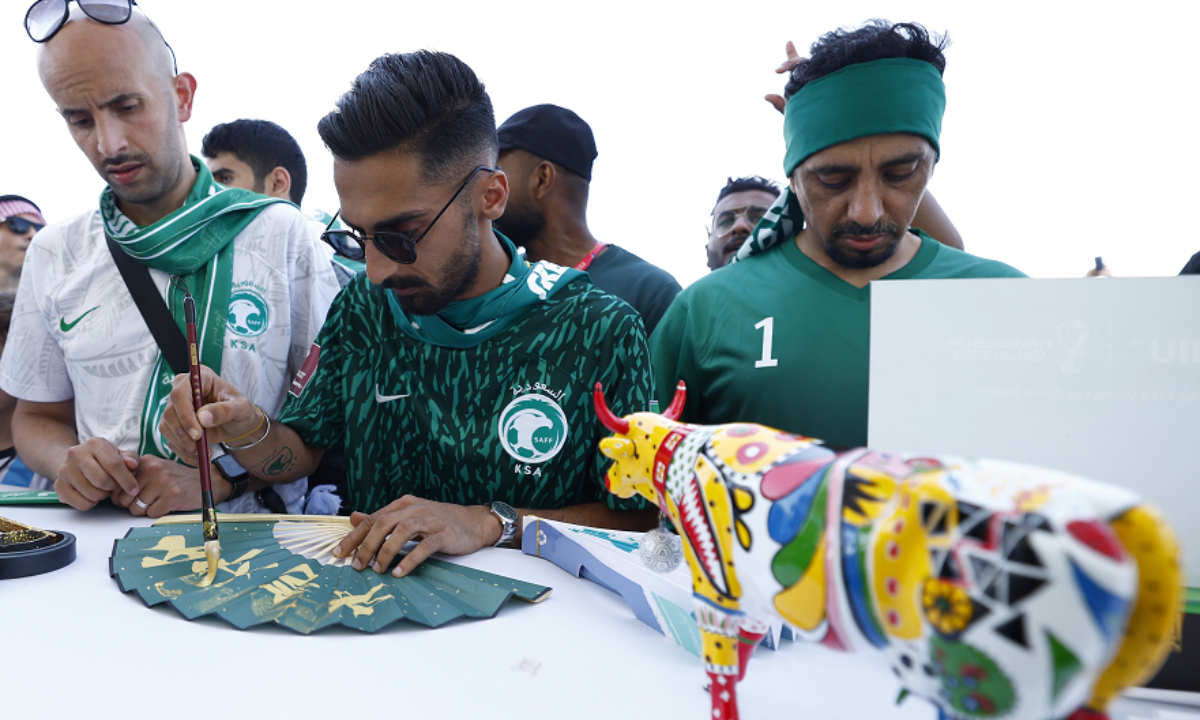
Saudi Arabian soccer fans learn to write Chinese characters at a Chinese brand stand outside Lusail Stadium in Qatar on November 22, 2022. Photo: VCG
Li Haidong, a professor from the Institute of International Relations at the China Foreign Affairs University in Beijing, told the Global Times on Monday that developing relations with China is the right decision that Saudi Arabia and other Gulf countries make in response to US' coercive diplomacy. They don't want to be the vassal of the US.
Li noted that pursuing independent and equal diplomacy suits Gulf states' own interests. Meanwhile, China and Gulf states can cooperate in a wide range of fields which should not be limited to energy, but also on important issues on the global stage, he said.
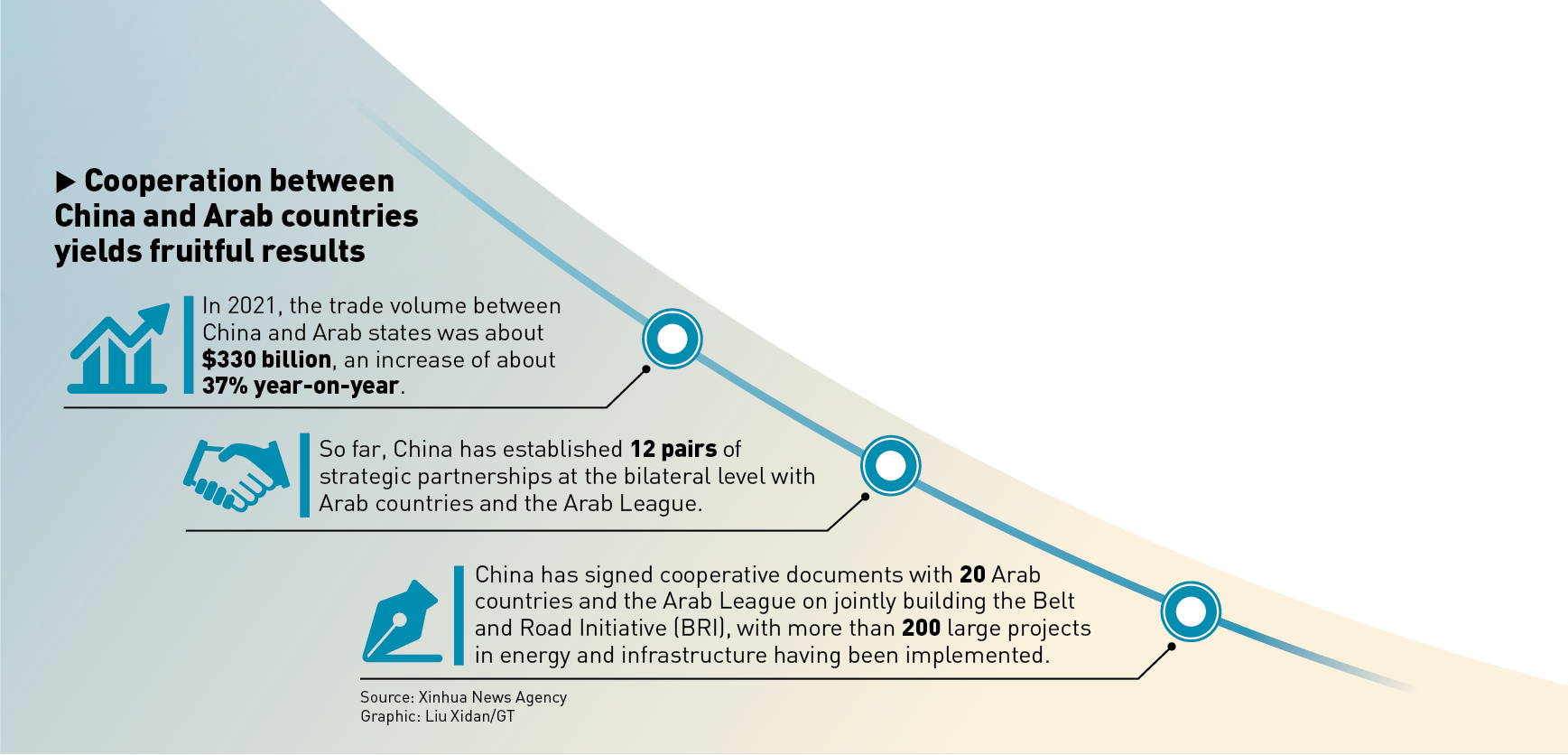
Graphic: GT
